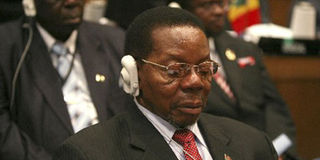Breaking News: Old Kijabe dam tragedy: Death toll rises to 45
Gbagbo should step down, says AU boss as Russia blocks council vote

African Union (AU) Chairman and Malawian President Bingu wa Mutharika ata summit in Ethiopia's capital Addis Ababa on February 2, 2010. Mutharika said he was “saddened” that Gbagbo had been sworn in against international opinion. Photo/FILE
BLANTYRE, Wednesday
Malawi President and African Union Chairman Bingu wa Mutharika on Wednesday demanded that Cote d’Ivoire leader Laurent Gbagbo “respect the will of the people” and stand down.
Mr Mutharika said he was “saddened” that Gbagbo had been sworn in against international opinion that opposition leader Alassane Ouattara won the November 28 poll, noting that the constitutional crisis had “widened” as a result.
“Mr Ouattara is the winner of the election,” the Malawi president said in a statement, shortly after regional leaders suspended Cote d’Ivoire over the crisis which has already seen 20 people killed and could provoke yet more conflict.
“President Gbagbo should respect the will of the people through the ballot and therefore needs to stand down to avoid another bloodshed in Africa over power.”
Mr Mutharika said he agreed with the assessment of the 15-nation Economic Community of West African States (ECOWAS), the African Union and international observers that Mr Ouattara won the election.
ECOWAS on Tuesday suspended Cote d’Ivoire over the crisis and called on Mr Gbagbo to yield power, saying it recognised Mr Ouattara as the new president.
Mr Mutharika’s statement came after an urgent African Union mediation mission led by former South African president Thabo Mbeki ended on Monday with no major announcement.
Cote d’Ivoire’s election was supposed to ensure peace after the country was split in half in 2002 and 2003 by a civil war, but instead it has been marred by deadly violence.
Human rights group Amnesty International said at least 20 people have been shot dead since the vote.
Meanwhile, Russia on Tuesday blocked a UN Security Council statement backing Mr Ouattara as Cote d’Ivoire’s new leader, diplomats said.
The United States accused Russia of “quibbling” over moves to support Mr Ouattara in his battle of nerves with Mr Gbagbo.
The United States wanted the council to “speak and speak plainly as part of a unified international effort to support” Cote d’Ivoire, she added.
Russia blocked a proposed statement saying the United Nations had exceeded its mandate by calling Mr Ouattara the winner of the November 28 runoff vote against Gbagbo, who has been president for nearly a decade, diplomats said.
Ms Rice insisted the United Nations had acted entirely within its Security Council mandate. “I don’t know why Russia is quibbling with resolutions that it, itself, voted for,” she said during a break in the tense negotiations.
Russia also objected to a statement made by Ms Rice during the latest Security Council meeting, that the presence of the Cote d’Ivoire ambassador named by Gbagbo did not imply recognition of his government, diplomats said.
The United States is the Security Council president for December and Rice chaired the meeting. She said she acted to “preserve the neutrality of the council.”
UN special envoy to Cote d’Ivoire Choi Young-jin, reaffirmed to the Security Council on Tuesday that he considered Mr Ouattara to be the winner of the landmark election by “a clear margin.”
The United States, European Union, African Union and most neighbouring states have all called for Mr Gbagbo to stand down.
Has refused to accept
Mr Gbagbo has refused to accept the results though. The Constitutional Court, which he controls, declared the official results void and Gbagbo was sworn in as president at the weekend.
Rice said the United States highlighted in the discussions “the crucial importance of the will of the people of (Ivory Coast) being respected, the reality of the fact that Ouattara has been elected needs to be respected.”
Ms Rice called Cote d’Ivoire a “unique situation” for the United Nations. Under a 2005 accord made between the two sides in Ivory Coast’s 2002 civil war, the United Nations was to play a central role in the electoral process.
The Security Council passed two resolutions setting out the role, including certifying the electoral process and results. Rice said the UN envoy “is not picking the winner. He is simply certifying the results of the Independent Electoral Commission.”
Meanwhile, Mr Gbagbo continues to occupy the presidential palace in Abidjan as Mr Ouattara’s government holds meetings in a hotel across town, heavily guarded by UN peacekeepers in armoured cars.
“The impasse could last weeks if the army continues to support the incumbent,” Eurasia Group analyst Anna Fruhauf said.




